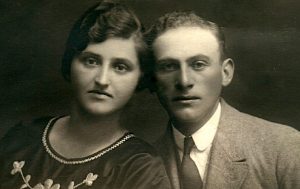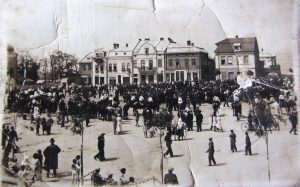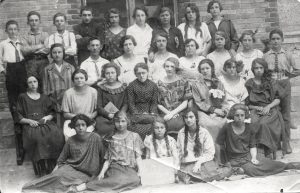(This is a chapter from Jack Glotzer’s memoir, I Survived the German Holocaust Against All Odds. Click here to return to the Table of Contents.)
I was born in the town of Rohatyn (Poland before World War II, now Ukraine) on January 12, 1925. Rohatyn is situated on the Lwów-Stanisławów[2] highway, approximately 70 km (43 miles) southeast of Lwów. Before the war the total population of Rohatyn was 9,000; one-third (3,000) were Jews.
I was the oldest son of Toba (née Barban) and Mayer Glotzer.[3] I was named after my mother’s father Jacob Barban, who was called Yankel. My nickname was Kuba[4] because the Ukrainian antisemites made fun of my name Yankel;[5] Kuba sounded more like a Ukrainian name.
We lived in our house on the outskirts of Rohatyn on Cerkiewna street No. 24.[6] We had several horses, cows, and a barn for them. Adjacent to our house was a big garden. The house was surrounded by orchards of fruit trees, currant bushes, and lots of greenery. The scenery was magnificent. Close to our house was a river called Gniła Lipa (meaning rotten linden) where I learned to swim. My father owned a butcher store at the rynek (the marketplace, in Polish).[7]
I had two brothers: Samuel[8] was a year younger than I. My youngest brother Moshe Emanuel[9] was born in April 1930. I adored my little brother; he used to follow me everywhere which was somewhat bothersome. However, in as much as I loved him very much, I did not object to his following me.
One incident stays in my memory. One time when my little brother was following me, we had to cross railroad tracks. The crossing gate was down and my brother ran across the tracks. The train was approaching, but he made it in time. I was in shock and hardly made it back home. After this episode I had nightmares.
My grandfather Kalmen Glotzer built our house exclusively for his children. My father’s sister Malkah Altman and her three sons,[10] my grandfather’s son Iser Glotzer[11] with his wife and two sons, and our family (my parents, I and my two brothers) lived in this house. Because we lived so close together, I played with my cousins very often and I enjoyed it very much. My father had another four sisters who lived in the USA and a brother Jacob who lived in Bielsko (Poland) with his wife and three daughters: Tonia (who we called Tosia), Clara, and Adela. Tosia was a big disappointment to the whole family. She converted to Catholicism and married (in church) a Polish man, Joseph Czekay. Tosia was very talented; she finished music conservatory and became an accomplished pianist. Tosia’s father sat Shivah[12] for her; nobody in the family was allowed to mention her name. Jacob and his family used to come to us during vacation time, but since this episode they stopped coming to us which made me very unhappy.
My father’s cousin Shiye Glotzer[13] also had a butcher store at the rynek; his wife’s name was Malkah. They had three daughters: Lusia, Rózia, and Gittl. We were very close to them.
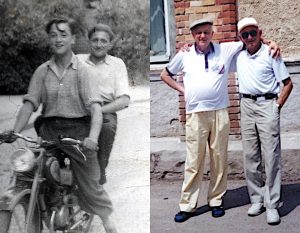
Lifelong friends Izie Haber and Jack Glotzer in Rohatyn in the late 1930s, and outside the “Red School” (today the Rohatyn Brothers Lyceum) in Rohatyn in 1998.
I had many friends with whom I played and spent a lot of time. Since the river Gniła Lipa was so close to our house, I learned to swim early. As I think now, we gave our parents much aggravation by going alone to the river. My best friends were Shlomo Laufer (he lived with his family very close to us), Buszko Kleinwaks, and Izie Haber. Having had so many cousins and friends nearby, I was never lonely. I enjoyed my life as a youngster.
My mother’s mother Leah Barban and my grandfather Yankel Barban were very loving grandparents. My mother’s side of the family was considered more aristocratic than my father’s. My grandfather was a mailman; it was unusual for a Jew to have a government position. My grandmother Leah was a midwife; she delivered almost every baby in Rohatyn. She was very respected, even by the gentiles.[14] They always took off their hats when greeting my grandmother. She was very generous to us. Every Passover, we three boys used to receive from her new suits and shoes.
My mother had a sister Zissl.[15] Zissl emigrated to the USA long before the war. She married Joseph Loew[16] (who was Rosette Faust Halpern’s uncle). They lived in the Bronx.
My mother had also a brother, Zev Barban. Zev was a very talented actor. He left for Israel (Palestine[17] at that time) and became a famous actor in the Tel Aviv theater Ohel. He married Dvora Kostelanetz who was an actress and sang professionally. He used to come to Rohatyn with his troupe and perform there.
My mother had also another brother Morris Barban[18] who was a lawyer.
My mother was a beautiful woman. She was very talented with her hands. She used to make beautiful needlepoints and crocheted curtains. She sent some of her needlework to the USA which is now in my possession. I remember her always doing something and singing. She was a very devoted mother.
I attended the grammar school named “Marszałka Piłsudskiego” (after the Polish Marshal Józef Piłsudski). We called it “Czerwona Szkoła” (Red School) because of the brick trimming.[19] I did not enjoy my school years; we, the Jewish students, constantly fought with the antisemitic boys. The Jewish boys were always blamed for starting the fights. My favorite school subjects were history and geography. I hated to memorize poems. I was more preoccupied going along with our workers in the wagon pulled by our horse. I finished seven years of elementary school. My grades were average; I never had a failing grade.
As was the custom, when I reached my 13th birthday, I became Bar Mitzvah.[20] I did not like to study with the Rebbies[21] (Jewish teachers) because they used to beat me and other Jewish children. (It is to be noted that Jewish boys who attended Hebrew schools, private or public, were often subjected to bodily abuse at the teacher’s discretion.)
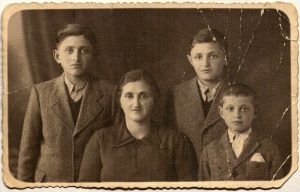
Jack’s family in Rohatyn ca. 1938. Left to right: Jack (Kuba), his mother Toba, his middle brother Samuel, and his youngest brother Moshe Emanuel.
My life changed considerably in 1937 when my father left for the USA. The reason for his decision to go to the USA was the refusal by the local government to permit ritual slaughtering of cows and calves. This regulation was called obrót rytualny (ritual turn).[22] Our business started to deteriorate because of this situation. My father had four sisters in the United States: Chane Kuperman, Rose Altman, Jeni Hecht, and Charne Schwartz. They sent proper documents to my father so that he could go to the USA. My father went to the USA with the expectation that he would bring over his family when he had established himself in the USA. My life changed considerably when my father left. I became the head of the family. My mother’s family helped us financially. My mother was depressed and suffered very much. I still have in my possession postcards written by my mother and my brothers to my father.
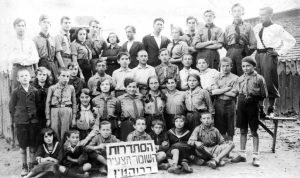
Members of the Zionist and Hebrew language group Hashomer Hatzair at a gathering in Rohatyn for the departure of one of their leaders to Palestine, ca. 1938. Source: Steinmetz Family Collection.
We had very active Zionist organizations in our town. Among them were Hanoar Haivri and Hashomer Hatzair. These organizations prepared their members for emigration to Palestine (today Israel) using spiritual and physical (Hakhshara) methods.[23] I was too young to be actively involved in any particular organization. I and my friends used to attend their meetings where we met the prettiest girls. My favorite organization was Gordonia because the prettiest girls were members there.
Rohatyn was famous for its young Jewish people. There were two gimnazjums[24] in Rohatyn. Jewish people were not admitted to pursue higher education; they had to go to Italy or other countries to continue. We had a famous soccer team named Maccabi.[25]
The situation before the outbreak of the war was tense. We were aware of Hitler’s activities in Germany. We were still hoping that my father would be able to send us the documents for our emigration to the USA.
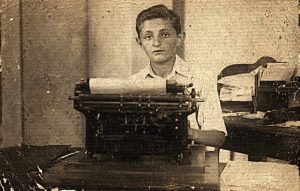
A young Samuel Glotzer at work in the law office of his uncle Morris Barban, in Rohatyn in the late 1930s.
My brother Samuel was very bright. He worked for my mother’s brother Morris Barban who was a lawyer; this helped us financially. Life was very difficult. My mother developed arthritis; she had extreme headaches. She did her best under very difficult circumstances to be a good mother to us. She kept a very clean house, and we were always well dressed. Our lives were “put in limbo.” We missed our father and waited for his letters which were scarce. This made my mother very depressed.
I remember a Jewish doctor from our town, Dr. Leventer and his wife. They left for New York in 1939 before the outbreak of the war to visit the world exhibition there. Dr. Leventer promised that he would speak to our father. He left his only son Marcel[26] with his family in Rohatyn. Dr. and Mrs. Leventer could not return to Rohatyn because the war broke out. They never saw their son again.
We envied everyone who was leaving for the USA. We were hoping every day to receive the letter from my father and the visas which would have permitted us to emigrate to the USA. My father was very disappointed in the USA; he missed us very much. I always had a feeling that his sisters in the USA were not too eager for my father to bring over another four persons to the USA. My father talked about returning to Rohatyn. I really do not know exactly the whole story. The visas from my father never came.
[2] Most of the place names in the original English version of this memoir were written according to Polish spelling, using the official names of the Second Polish Republic. In the Ukrainian-language version, geographical names have been adapted to modern Ukrainian norms, except for cases where the names of places have changed significantly. Thus, in Ukrainian we write “Lwów” as “Lviv”, and we leave “Stanisławów” as “Stanislaviv” instead of using the modern name – “Ivano-Frankivsk.” See also the note on the text at the end of the memoir. – Ed. [3] The original memoir uses American English versions of many family names and surnames which were originally written and spoken in Polish, Yiddish, Hebrew, and German. Toba Barban Glotzer is recorded as “Tovah” in Yad Vashem and Yizkor Book victims lists. Mayer Glotzer is recorded as “Majer” (phonetically similar) in Polish records. Family name spellings from the original memoir have been retained in this edition with known variants in footnotes. See also the note on the text at the end of the memoir. – Ed. [4] “Kuba” is a diminutive of “Jakub” in Polish language, and not close to Ukrainian names but would have been familiar to Ukrainians in Rohatyn from its Polish roots. “Jakub” or “Jacób” is the Polish version of Yiddish “Yankel” and Hebrew “Ya’akov” (as well as English “Jacob” and “Jack”). Jack retained the name “Kuba” as his legal identity from the time he left Poland through his US naturalization in the 1950s, and to the end of his life with his friends and family. – Ed. [5] In Poland during the interwar period (1918-1939), antisemitism was part of the political, social, and cultural life of the country; there were people with anti-Jewish views among the Polish and Ukrainian populations of the time. – Ed. [6] Today the street is named vul. Kotsiubynskoho. Where the former Glotzer house stood has not been determined. – Ed. [7] Today this place at the center of Rohatyn is called Roksolana Square. – Ed. [8] Jack’s younger brother Samuel was sometimes called by the Hebrew equivalent “Shmul” (an anglicized alternate of “Shmuel” and the Polish “Szmul”) in the original edition of this memoir, as well as “Miko,” a nickname used within the family. This edition uses Samuel throughout, for clarity. – Ed. [9] Jack’s youngest brother Moshe Emanuel was occasionally called “Edmund” (his Polish school name) and by the diminutive “Munio” in the original edition of this memoir. This edition uses Moshe Emanuel throughout, for clarity. – Ed. [10] Her husband Max Altman went to the USA before the war with the intention of bringing his family to the USA. (Jack forgot here that Max and Malkah Altman had a daughter Clara and two sons, Josie and Izie; Clara and Josie figure prominently later in Jack’s story. – Ed.) [11] Iser Glotzer was also called Isidore; his wife’s name was Esther. – Ed. [12] A Hebrew term meaning “seven” which refers to the first seven days of mourning after burial. It is customary for the closest relatives of the deceased to “sit Shivah”. [13] In other sources, Shiye Glotzer is called Yehoshua, Jeszue, or Oziasz. – Ed. [14] People of non-Jewish faiths. [15] Toba Barban’s older sister Zissl was also called Sophie. – Ed. [16] Joseph Loew was also called Samuel-Joseph. – Ed. [17] Mandatory Palestine (which Jewish people referred to as Eretz Israel or the Land of Israel) did not have state sovereignty but was administered by British authorities under a mandate from the League of Nations following the collapse of the Ottoman Empire in World War I; the area’s population was dominated by two ethnic communities: Jews and Arabs. After World War II, the mandate was terminated and a portion of Palestine became the modern State of Israel. – Ed. [18] Morris Barban was also called Moshe and Maurycy. – Ed. [19] Polish grammar or elementary schools taught from first through seventh grade, i.e. for students up to 15 years of age. Today the “Red School” is the Lyceum “Rohatyn Brothers”, at vul. Shevchenko 12. – Ed. [20] A Hebrew term meaning “son of commandment” applied to a Jewish boy who reaches his thirteenth birthday and attains the age of religious duty and responsibility. [21] In Jewish religious and cultural tradition, “Rebbie” or “Rebbe” is a term for a knowledgeable teacher (melamed) in Jewish religious primary schools (cheders) but is also a respectful address to the Rabbi (the head of the Jewish religious community). – Ed. [22] This term is not recorded in official documents of the period; it appears to be a common or “folk” designation. At the time, Poland had enacted a series of anti-Jewish laws under which local authorities could impose restrictions on the ritual slaughter of livestock, or create barriers to the licensing and sale of meat, or raise taxes for Jewish butchers. For Jewish communities, the ritual slaughter of livestock was very important: using kosher meat was key to observing the food traditions of Judaism, and, in general, one of the important markers of Jewish religious identity. – Ed. [23] Physical training of Jewish youth to prepare them for emigration to Palestine. (In interwar Poland, there was a very well-developed network of Zionist youth educational, cultural, and sports organizations. Their primary goal was to prepare Jewish youth for emigration to Eretz Israel, then known as Palestine under British mandate, and the struggle for the creation of a Jewish state on the historical lands of the Middle East. Such institutions existed for both girls and boys. Famous organizations included: Hashomer Hatzair or “Young Guard,” founded in 1913 in Lviv, plus Maccabi, Gordonia, Tarbut, Beit Yaakov, and others. The full name of Hanoar Haivri is Agudat Hanoar Haivri Akiba. – Ed.) [24] A high school in Poland. [25] “Maccabi” is a worldwide Jewish sports organization created at the turn of the 19th to 20th centuries. The name translated from Hebrew means “hammer” and evokes the ancient struggle of the Jews for independent statehood, specifically the Maccabean Revolt in the 2nd century BCE against the Syrian-Greek Seleucid conquerors of Judea (Eretz Israel) and the establishment of the autonomous Jewish Hasmonean dynasty. – Ed. [26] Marcel Leventer, also called Moshe, was the son of Tzila and Dr. Yitzhak Leventer. – Ed.
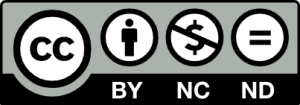 Published by the Ukrainian Center for Holocaust Studies, (UCHS), Kyiv. This work is licensed under the Creative Commons Attribution-NonCommercial-NoDerivatives 4.0 International License. To view a copy of this license, visit http://creativecommons.org/licenses/by-nc-nd/4.0/ or send a letter to Creative Commons, PO Box 1866, Mountain View, CA 94042, USA.
Published by the Ukrainian Center for Holocaust Studies, (UCHS), Kyiv. This work is licensed under the Creative Commons Attribution-NonCommercial-NoDerivatives 4.0 International License. To view a copy of this license, visit http://creativecommons.org/licenses/by-nc-nd/4.0/ or send a letter to Creative Commons, PO Box 1866, Mountain View, CA 94042, USA.
<- Back to the previous section

